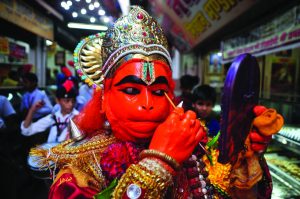 It seems that the world is asking India, “Is this the best that world’s largest democracy has to offer?” At a time when ‘political credibility’ is almost a lost virtue, it’s no wonder politicians ignore the fact that political leadership is as much about them as it is about those they serve. More broadly, a nation’s political culture is to a great extent reflected in politicians’ motives for using power and influence. The desperate politicians seeking power nurture the notion that they are uniquely qualified to guide people to wellbeing. However, what makes the matters worse is the growing number of leaders better known for a style that is cheap, revengeful and vitriolic. And, it is mostly this category of politicians, responsible for rising intensity of the country’s political climate who consider increased sacralisation of certain animals and particular faith as part of new age political agenda – an agenda for using religion as a political fig leaf.
It seems that the world is asking India, “Is this the best that world’s largest democracy has to offer?” At a time when ‘political credibility’ is almost a lost virtue, it’s no wonder politicians ignore the fact that political leadership is as much about them as it is about those they serve. More broadly, a nation’s political culture is to a great extent reflected in politicians’ motives for using power and influence. The desperate politicians seeking power nurture the notion that they are uniquely qualified to guide people to wellbeing. However, what makes the matters worse is the growing number of leaders better known for a style that is cheap, revengeful and vitriolic. And, it is mostly this category of politicians, responsible for rising intensity of the country’s political climate who consider increased sacralisation of certain animals and particular faith as part of new age political agenda – an agenda for using religion as a political fig leaf.
Animals have a distinctive place in almost all prehistoric cultures and some are accorded special status. Put simply, in various religions, animals are worshiped either in the form of god or symbols and are given high reverence. In Indian mythology, Hanuman, the Hindu monkey god in epic Ramayana is regarded as a perfect symbol of selflessness and devoted service. He is one of the most celebrated and worshipped figures because of his bravery, perseverance and strength. Also, cow, given the honour of a mother in our country is another most venerated animal. The representative of divine in Hinduism, cow, is considered as holy, generous and docile creature.
The other highly revered animals associated with Hindu deities include tiger, elephant, snake etc. Many Egyptian, Roman and Greek Gods also are associated with animals — sheep, pig, horse, goat, wolf etc. Therefore, it’s not India alone; several other countries also regard quite a few animals highly. From Nepal, Vietnam, Korea, Thailand to China, Japan, Turkey, Africa. But, what makes India unique from other countries is its brazen political exploitation of non human divine entities — Intertwining religion and politics cinvolving revered animals, so to say. While cow-centric political discourse centred on cow vigilantism and lynching incidents, Hanuman-centric political discourse centred on Hanuman’s identity and social status; all aimed at bolstering political image.
Conundrum over caste
Ever since the revered disciple of Lord Ram faced identity politics, debates on his caste — religion gained political traction. And, it’s despite country having shocking history of caste based conflicts. According to Ministry of Home Affairs, India witnessed 10,399 incidents of communal violence from 2004 to 2017 wherein 1,605 people were killed and 30,723 were injured.
Hence, dragging Hanuman into politics of caste and religion has been apparently deliberate and conscious; just to have discernable political impact on people. Sadly, issues like Hanuman’s caste analysis reached its rabble-rousing zenith as the country remained truly hungry for progressive and constructive politics.
The Oxford journal article Animals in the constitutional state mentions a profound quotation by Catharine MacKinnon. The American radical legal scholar proposes that animals do “dissent from human hegemony,” observing that “they vote with their feet by running away. They bite back, scream in alarm, withhold affection, approach warily, fly and swim off.”
However, since our exploitative politicians are in the know that their Hanuman is not the dissenting one, they merrily continue to put forth varying versions of Lord Hanuman’s identity to their advantage.
Mixing of religion and politics
It’s not that politicisation of caste and religion that continued with cow and monkey will end with Durga Puja grants, stipends for Imams, pension for seers and Sabarimala issue — because these are all-too-familiar trajectory to retain political support base while simultaneously supplementing it enough to ensure electoral victories. To be sure, there are plenty of political ploys that Indian political leaders have used that are appalling and hypocritical. But when it comes to basic democratic decorum — or lack thereof — it’s hard to think of anything that compares to manipulating religious sensitivities.
Oblivious to absolute commercialisation of religion, indifferent to discharge of the sewer and drainage into river Ganga (considered holiest river in any religion), unconcerned about still continuing devadasi custom, unresponsive to greater accountability in public life, political parties continue to avert their attention from the real issues to reinforce their recourse to populism. And therefore, while the responsibility squarely lies with the political parties for playing with the feelings of primarily semi-literate and illiterate people, we cannot see it divorced from the new normal of political demonization that plagues us today.
In a country with fair levels of religious observance, the takeaway so far from politicians’ downright mixing of religion with politics has been that religious faith, reduced to political analysis, does little for one’s moral upliftment and even less for society. If anything, it only magnifies one’s moral cowardice.
Devdutt Pattanaik in an article “How Lord Hanuman can make leaders good human beings” writes “Hanuman is powerful. So he does not have the need to intimidate people. He presents himself as a monkey, playful and mischievous, bowing to Ram, happy to be a servant, when everyone knows this little monkey can turn into a giant, fly across the sea, sprout five to ten heads to become Mahabali, conquer ghosts and goblins and even rescue Ram. He does not have to display his power. He does not have to make you feel powerless……….. Leaders often behave like Ravana. They are glamorous and entitled. And they use their power to dominate and be territorial. ”
Since politicians loved, admired, and respected by the people are few and far between, it’s time for believers invoking Hanuman, the Sankat mochan (Danger freeing) and refrain from provoking the Hanuman, Sankat amantrana (Danger inviting). As for political parties consumed by poor politics, priority should be freeing religion from political grip. It’s also time for ordinary people like us to be aware of those brazenly indulging into politics on cast and religious lines and reject them completely.
letters@tehelka.com













